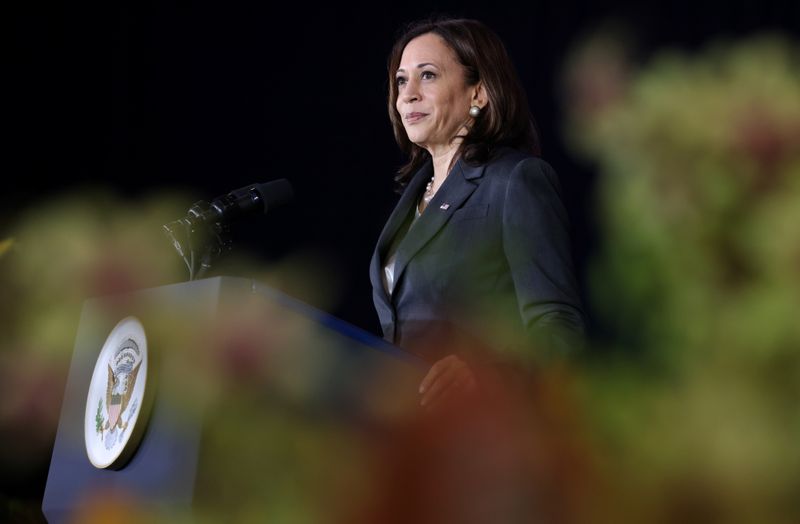By Nandita Bose
SINGAPORE (Reuters) -U.S. Vice President Kamala Harris on Tuesday accused Beijing of coercion and intimidation to back unlawful claims in the South China Sea, her most pointed comments on China during a visit to Southeast Asia, which she said was critical to U.S. security.
Harris's seven-day trip to Singapore and Vietnam, only her second foray internationally, is aimed at standing up to China's growing security and economic influence, addressing concerns about China's claims to disputed parts of the South China Sea and showing Washington can lead the way.
In a speech in Singapore, Harris laid out the U.S. vision for the region built on human rights and a rules based international order and sought to solidify a U.S. pivot towards Asia.
She said the United States had put itself forward to host a 2023 meeting of the 21-member Asia-Pacific trade group APEC, which includes the United States, China and Russia.
Diverting attention and resources to the region has become a centrepiece of President Joe Biden's administration, as it turns away from old security preoccupations with the withdrawal of U.S. forces from Afghanistan.
The U.S. administration has called rivalry with China "the biggest geopolitical test" of the century and Southeast Asia has seen a series of high-profile visits by top administration officials, including Secretary of Defense Lloyd Austin.
"We know that Beijing continues to coerce, to intimidate and to make claims to the vast majority of the South China Sea," Harris said in her speech.
"These unlawful claims have been rejected by the 2016 arbitral tribunal decision, and Beijing's actions continue to undermine the rules-based order and threaten the sovereignty of nations," she said, referring to an international tribunal's ruling over China's claims in The Hague.
China rejected the ruling and has stood by its claim to most of the waters within a so-called Nine Dash Line on its maps, parts of which Brunei, Malaysia, the Philippines and Vietnam also claim.
China's foreign ministry spokesman, Wang Wenbin, in response to Harris's comments, said the "order" that the United States wanted was one in which it could "wilfully slander, oppress, coerce and bully other countries and not have to pay any price".
China has established military outposts on artificial islands in the waters, which are crossed by vital shipping lanes and also contain gas fields and rich fishing grounds.
The U.S. Navy regularly conducts "freedom of navigation" operations through the disputed waters, which China objects to, saying they do not help promote peace or stability.
On board the USS Tulsa, a U.S. combat ship at the Changi Naval base in Singapore on Monday, Harris told U.S. sailors "a big part of the history of the 21st century will be written about this very region" and their work defending it was pivotal.
On Monday, Harris began her trip by meeting Singapore's Prime Minister Lee Hsien Loong.
They discussed https://www.reuters.com/world/kamala-harris-visits-singapore-deepen-ties-counter-chinas-influence-2021-08-22 the importance of rules and freedom of navigation in the Indo-Pacific region, expanded cybersecurity cooperation and efforts to shore up critical supply chains between their countries.
"Our partnerships in Singapore, in Southeast Asia and throughout the Indo-Pacific are a top priority for the United States," Harris said on Tuesday, adding the region was "critically important to our nation's security and prosperity".
A top Chinese diplomat last month accused the United States of creating an "imaginary enemy" to divert attention from domestic problems and to suppress China.
Part of her task during the trip will be convincing leaders in the region that the U.S. commitment to Southeast Asia is firm and not a parallel to Afghanistan.
Biden has faced criticism over his handling of the withdrawal of U.S. forces and the chaotic evacuation after the lightning takeover of Afghanistan by the Taliban.

Harris opened her speech on Tuesday talking about Afghanistan and said the United States was "laser focused" on the task of "safely evacuating American citizens, international partners, Afghans who worked side by side with us, and other Afghans at risk".
After her speech, Harris held a roundtable discussion with business leaders on supply chain issues. Later, she was due to travel to Vietnam, where she will meet top officials on Wednesday.